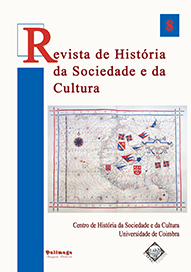Os Pais da Pátria Liberal
DOI:
https://doi.org/10.14195/1645-2259_8_7Palavras-chave:
revolução liberal, vintismo, republicanismo neo-romano, despotismo, absolutismo, catonismo, virtude cívica, mitos de fundação, religião civil, patriotismo, pátria, direito natural, historicismo, regeneração, decadênciaResumo
Perante as revoluções liberais europeias e americanas dos séculos XVIII e inícios de Oitocentos, temos por certo que será mais operativo caracterizá-las como sendo filhas de movimentos de inspiração patriótica, do que, como anacronicamente não raro acontece, do nacionalismo. Entre os indícios que podem corroborar esta perspectiva, encontram-se as designações a que os seus protagonistas recorreram, já que toda a linguagem transporta consigo visões do mundo e não é politicamente neutra. E impressiona, desde logo, a sobrevivência das referências a figuras e a fontes da Grécia e sobretudo de Roma. Ora, reduzir a sua utilidade à retórica será não perceber que elas, miscigenadas não só com as suas actualizações modernas europeias, mas também nacionais, ajudavam a repensar os elos que deviam existir entre a ética e a política, bem como a definir qual o caminho histórico a seguir, mormente quando, como foi o caso exemplar da Revolução Liberal de 1820, as invocações arquetípicas estavam sobredeterminadas pela urgência de se refundar a pátria decaída. Daí, a relevância que conferimos à análise do modo concreto como funcionou, dentro desta estratégia, a voga de se atribuir aos artífices da queda do absolutismo os antigos cognomes de "Pais da Pátria", em ordem a que igualmente se possa perceber como é que a herança do Olimpo cívico do classicismo foi recebendo a crescente companhia dos eleitos para o Eliseu nacional em construção.
Downloads
##submission.downloads##
Publicado
Edição
Secção
Licença

Este trabalho encontra-se publicado com a Licença Internacional Creative Commons Atribuição 4.0.
Los autores conservan los derechos de autor y conceden a la revista el derecho de primera publicación, estando el trabajo simultáneamente bajo la Licencia de Atribución de Creative Commons que permite compartir el trabajo con el reconocimiento de la autoría y la publicación inicial en esta revista.











